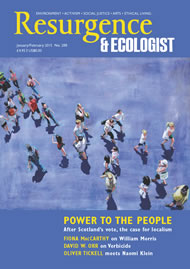Frédéric Gros is an academic philosopher, but don’t let that put you off. His writing is lively, vivid, thought-provoking and beautifully clear. “Walking is not a sport,” he declares at the outset, despising those who think it is: hikers who ignore the view from a mountain top, instead “discussing their time with enthusiasm and making incomprehensible calculations”; people in groups who “boast about their equipment. When it’s time to eat, they want you to ‘taste this’, they produce culinary treats, outbid each other… It’s hell.” His impatience is invigorating and does not obscure his major concern, which is to convey walking’s meditative and restorative value.
Walking, for Gros, is an escape from the chaos of competitiveness and consumerism – it allows you to be, he says, “disentangled from the web of exchanges, no longer reduced to a junction in the network redistributing information, images and goods”. You can even – and most importantly perhaps – “escape from the very idea of identity, the temptation to be someone, to have a name and a history”. “Not being anyone” for a while brings with it the child’s freedom to enjoy, fully and without comparison, whatever is to hand (whatever is to foot, perhaps). You lose interest in the latest news: you are released from the compulsion to boast of achievements; you no longer fear failure; there is finally no need even to speak. Indeed, in the silence of walking, language comes into better perspective. Through walking, you may see that our language “reproduces our sequencings of action, our laborious grasp of things, our fuss and bustle”. Objects, freed from the names we give them, are seen more clearly; the sounds in the world can be heard.
From loathing hikers to a theory of language is a big step, but one that Gros makes effortlessly and persuasively. His book contains chapters on walking in general (on ‘Silences’, ‘Slowness’ and ‘Eternities’, for example, plus a brilliant discussion of how, in our sedentary lives, we conceive and misconceive the ‘Outside’). Alternating with these, he includes longer chapters on great walkers: Nietzsche, Rimbaud, Rousseau and others, culminating in an even-handed portrait of Gandhi, admirable for not overstating what his passive resistance was able to achieve. Gros’s few pages on the little-known French poet Nerval, his melancholy and suicide, are particularly moving, and for a similar reason. Because walking didn’t save Nerval, the chapter serves as an internal challenge to Gros’s advocacy elsewhere in the book, acknowledging limit.
Each of these exemplary figures comes, however, from the increasingly distant past. Gros’s model of walking is essentially a Romantic one. Where do (or can) we walk in contemporary life? In the 19th century, strolling through the vast new cities of industrial Europe became a distinctive pleasure, enjoyed by the ‘flâneur’. “The question that now arises,” Gros comments, is
whether the spread of uniform brands (‘chains’ as we call them without irony […]) and the aggressive expansion of traffic haven’t made urban strolling more difficult, less delightful and surprising. Spaces where strolling is compulsory are being made, but no one has to go there.
It is a key question, and one that Gros leaves hanging. His investment in escape – in walking as escape – makes it, in fact, a difficult issue for him to address. Reclaiming the streets may be more important for us than getting away from it all; the dream of escape is infected by – infested with – the consumerism it seems to reject. There is an alternative. Walking the dog or walking to work, building walking into the pattern of our everyday lives and seeing it as an activity that helps to build community (instead of offering us a momentary release from the destructive pressures of society) – all these valuable possibilities barely figure in Gros’s account. Walking is, I agree, absolutely not a sport. It may have, though, more affinities with dancing – with social play and display, with conversation and interaction – than is allowed by this marvellous, energising book.







